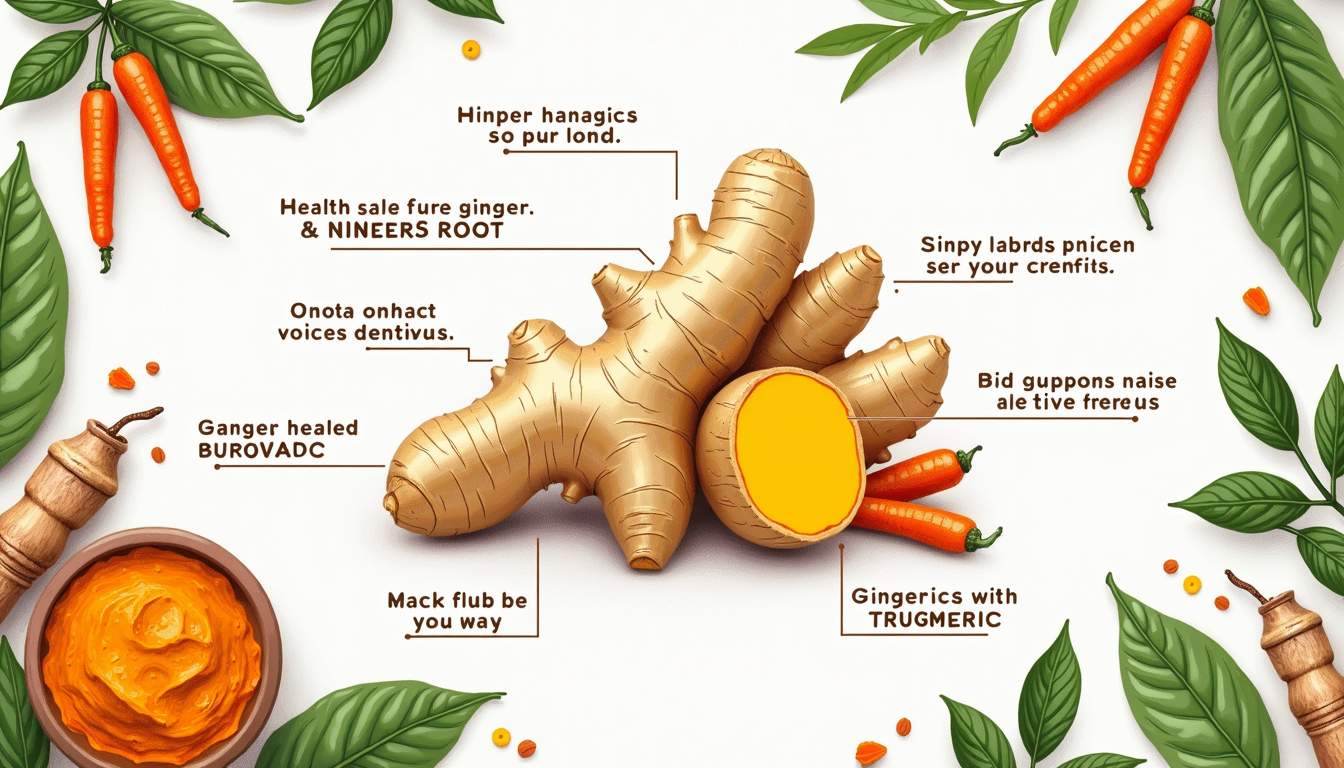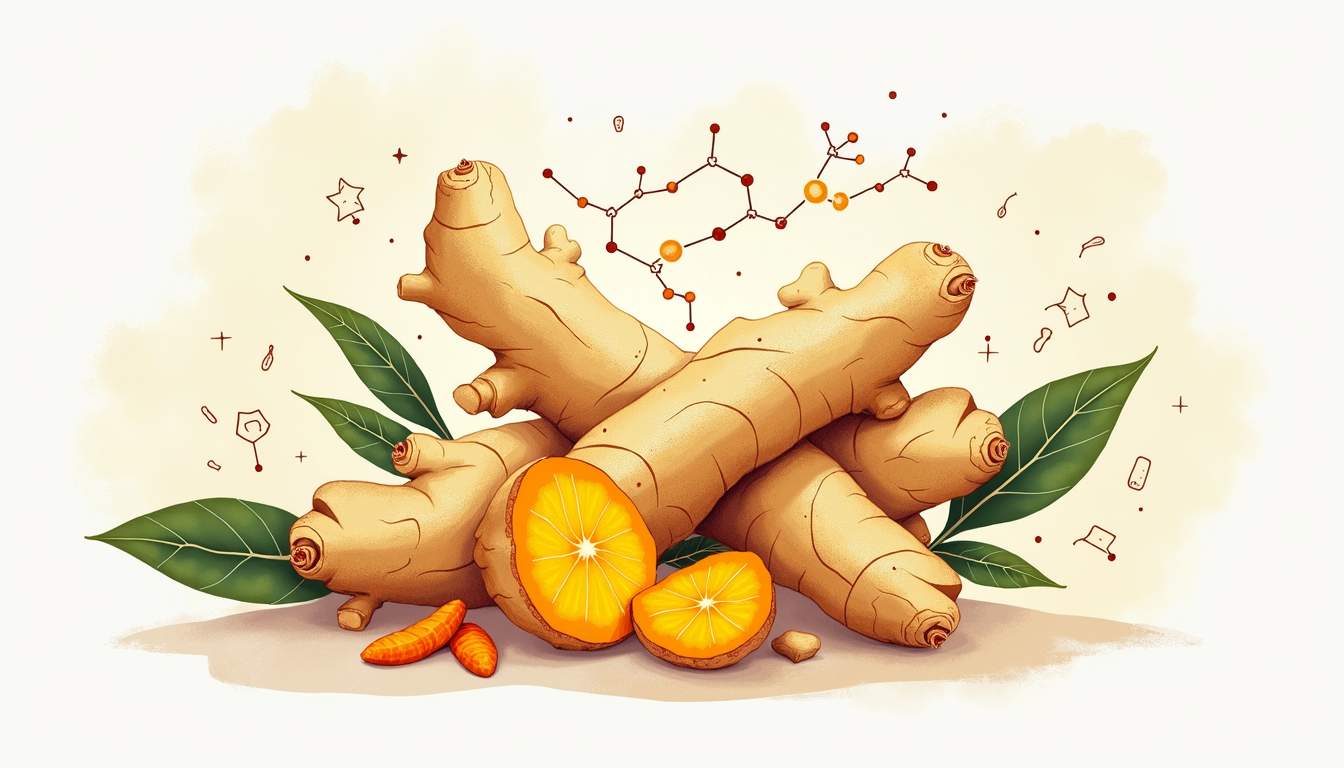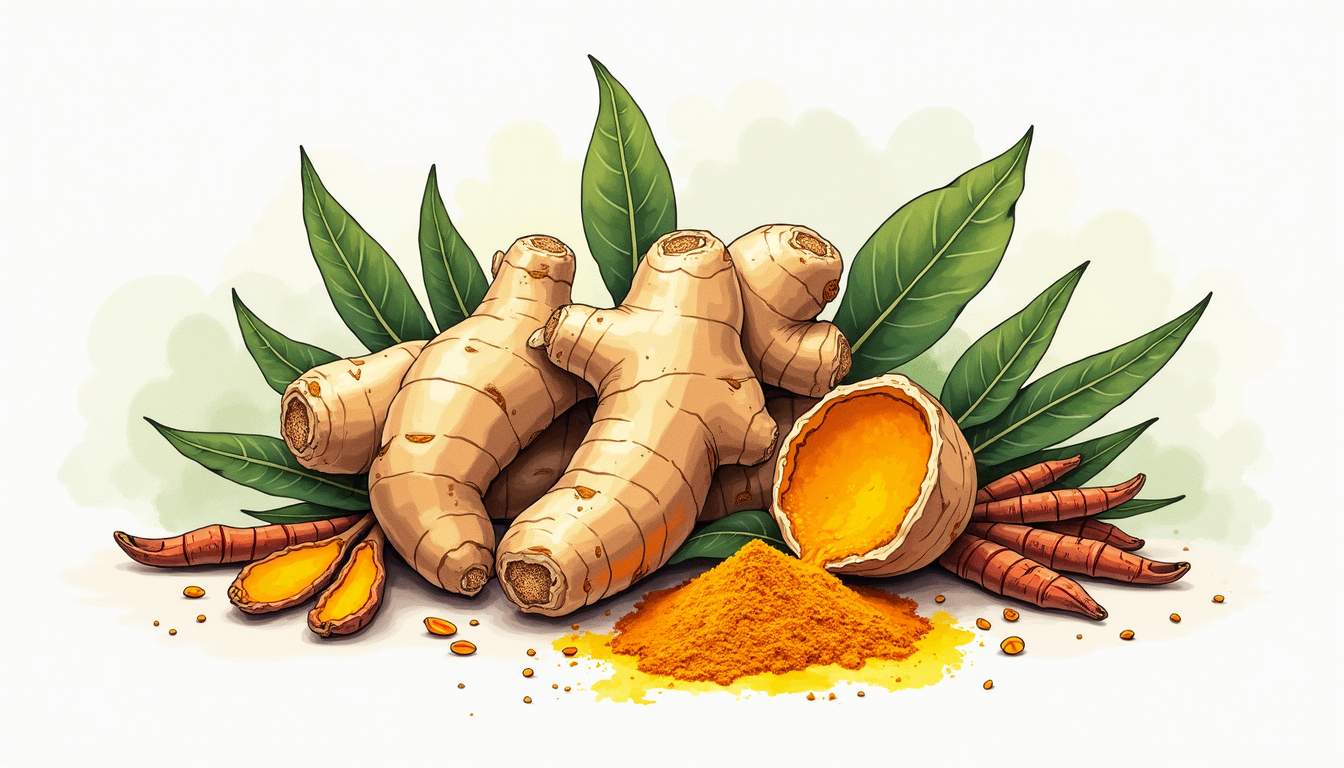Ginger and turmeric supplements offer powerful anti-inflammatory, antioxidant, and digestive health benefits. Rich in gingerol and curcumin, these natural compounds may reduce pain, support immune function, and promote overall wellness when taken daily.
Understanding Ginger and Turmeric
Historical Use in Traditional Medicine
Ginger (Zingiber officinale) and turmeric (Curcuma longa) have deep roots in traditional medicine systems, particularly in Ayurveda and Traditional Chinese Medicine. Ginger has long been used to treat digestive issues, nausea, and inflammation, while turmeric has been recognized for its anti-inflammatory and antioxidant properties. Ancient texts from India and China document the use of these spices for various ailments, showcasing their importance in holistic health practices.

In Ayurvedic medicine, turmeric is often referred to as "golden spice" due to its vibrant color and numerous health benefits. It has been utilized to improve digestion, enhance liver function, and promote skin health. Similarly, ginger has been a staple in herbal remedies for its ability to alleviate motion sickness, reduce inflammation, and boost the immune system. The historical significance of these spices is not just limited to their medicinal properties; they have also played a role in culinary traditions, adding flavor and warmth to dishes across cultures. In many Asian cuisines, ginger and turmeric are essential ingredients, not only for their taste but also for the health benefits they impart, reflecting a deep-seated belief in food as medicine.
Key Active Compounds and Properties
The health benefits of ginger and turmeric can be attributed to their unique active compounds. Ginger contains gingerol, a bioactive compound known for its anti-inflammatory and antioxidant effects. This compound is responsible for ginger's characteristic flavor and many of its therapeutic properties. Studies have shown that gingerol can help reduce oxidative stress, which is linked to various chronic diseases, thereby highlighting the importance of including ginger in a balanced diet.
Turmeric, on the other hand, is rich in curcumin, a powerful polyphenol that has garnered significant attention for its health-promoting effects. Curcumin is known for its ability to modulate various biological pathways, making it a subject of interest in numerous scientific studies. Research suggests that curcumin may help in the management of conditions such as arthritis, cardiovascular diseases, and even certain types of cancer due to its ability to inhibit inflammatory processes. Together, gingerol and curcumin create a synergistic effect that enhances the overall health benefits of these two spices when taken as a supplement. This synergy is often harnessed in modern formulations, combining both ingredients to maximize their therapeutic potential, making them a popular choice in the realm of natural health products.
Health Benefits and Scientific Evidence
Anti-inflammatory and Pain-Reducing Effects
One of the most well-documented benefits of ginger and turmeric is their anti-inflammatory properties. Chronic inflammation is linked to various health conditions, including arthritis, heart disease, and certain cancers. Research has shown that both ginger and turmeric can help reduce inflammation markers in the body, providing relief for individuals suffering from inflammatory conditions.

Several studies have demonstrated that curcumin can inhibit the activity of inflammatory enzymes and cytokines, leading to a decrease in pain and swelling. Similarly, ginger has been shown to be effective in reducing muscle pain and soreness, making it a popular choice among athletes and active individuals. The combination of these two spices in supplement form may offer enhanced pain relief and improved joint function. Additionally, the synergistic effect of ginger and turmeric may amplify their individual benefits, creating a powerful duo that can be particularly effective for those with chronic pain or inflammatory disorders.
Digestive Health and Immune System Support
Ginger has long been recognized for its ability to support digestive health. It aids in the digestion of food, reduces bloating, and can help alleviate nausea, particularly in pregnant women and individuals undergoing chemotherapy. Turmeric also plays a role in digestive health by promoting bile production, which is essential for fat digestion. Furthermore, ginger has been found to stimulate saliva and bile production, enhancing overall digestive efficiency and nutrient absorption.
Moreover, both ginger and turmeric have immune-boosting properties. Ginger's antimicrobial effects can help combat infections, while curcumin has been shown to enhance the body's immune response. Regular consumption of these supplements may contribute to a stronger immune system, helping to ward off illnesses and infections. In addition to their direct effects on the immune system, these spices also contain antioxidants that help protect the body from oxidative stress, further supporting overall health. Incorporating ginger and turmeric into your diet can be as simple as adding them to smoothies, teas, or soups, making it easy to enjoy their numerous health benefits on a daily basis.
Incorporating Supplements into Your Wellness Routine
Recommended Dosages and Potential Interactions
When considering ginger and turmeric supplements, it is essential to adhere to recommended dosages to maximize benefits while minimizing potential side effects. Typical dosages for ginger range from 500 to 2000 mg per day, while curcumin supplements are often taken in doses of 500 to 2000 mg, depending on the formulation and concentration.
However, it is crucial to consult with a healthcare professional before starting any new supplement regimen, especially for individuals taking medications or those with underlying health conditions. Ginger and turmeric can interact with certain medications, such as blood thinners and anti-diabetic drugs, so professional guidance is advisable. Additionally, individuals who are pregnant or breastfeeding should exercise caution, as the effects of high doses of these supplements during pregnancy are not fully understood. Always prioritize safety and seek personalized advice tailored to your unique health profile.
Different Forms and How to Choose Quality Supplements
Ginger and turmeric supplements are available in various forms, including capsules, powders, teas, and tinctures. Each form has its advantages, and the choice often depends on personal preference and lifestyle. Capsules are convenient for those on the go, while powders can be easily added to smoothies, soups, or teas for a flavorful boost. For those who enjoy a more traditional approach, brewing ginger or turmeric tea can provide a soothing ritual that also delivers the health benefits of these spices.
When selecting supplements, it is essential to choose high-quality products from reputable manufacturers. Look for supplements that contain standardized extracts to ensure a consistent concentration of active compounds. Additionally, third-party testing can provide assurance of purity and potency, helping consumers make informed choices. It’s also beneficial to read reviews and check for certifications, such as Good Manufacturing Practices (GMP), which indicate that the product meets specific quality standards. By taking the time to research and choose wisely, you can ensure that the supplements you incorporate into your wellness routine are both effective and safe.
Moreover, understanding the bioavailability of these supplements can enhance their effectiveness. Curcumin, for instance, is known for its poor absorption in the body, but combining it with black pepper extract (piperine) can significantly increase its bioavailability. This synergy not only maximizes the benefits but also makes it easier to incorporate into your daily routine without the need for excessive dosages. As you explore the various options available, consider experimenting with different forms and combinations to discover what works best for your body and lifestyle.
For a high-quality blend that combines turmeric with black pepper for enhanced absorption, explore our Turmeric + Curcuma supplement here.

Share:
Turmeric Powder Supplement: Benefits, Dosage, and How to Use It for Optimal Health
Turmeric and Black Pepper: Side Effects, Safety, and When to Avoid